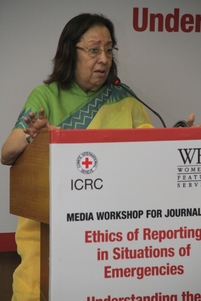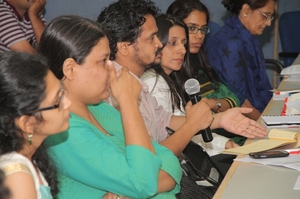The ICRC, in partnership with Women’s Feature Service (WFS), organised a daylong workshop for working journalists on 12 September at India Habitat Centre, New Delhi. The workshop was inaugurated by Dr Najma Heptullah, minister of minority affairs of the Government of India. More than 30 journalists from national newspapers, online portals and development networks attended the event.
While focussing on the ethics of reporting in emergencies, the workshop touched upon the challenges and constraints of reporting on crises. The event also gave participating journalists a chance to gain insights from the first-hand experiences of some senior journalists.
The workshop started with an interactive session by Surinder Oberoi, communication and political advisor, ICRC, New Delhi. Mr Oberoi talked about the dos and don’ts of reporting from emergencies. While giving the participants tips on verifying news and dealing with unseen challenges, he also expounded on effective and ethical reporting.
Dr Heptullah’s key message to the journalists was: “Don’t show what is beyond necessary.” “Maintaining neutrality is the key in situations of emergencies. As journalists, one needs to draw a line to respect the privacy of others and be equally concerned about his or her own safety,” she added.
Mary Werntz, the head of the regional delegation of the ICRC in India, Bhutan and the Maldives, while addressing the participants, said as wars and violence evolve, the media has also evolved, as has the ICRC. We now work in modern theatres of warfare, where a click is the new trigger and viruses, the new explosives, she said. “As a response to such emergencies, the ICRC sees today’s media as being not just the messenger, but also a vital catalyst in shaping how the world responds to human suffering. The journalists today do not allow us to look away from the suffering, rather they bring it right into our living rooms — be it through 24×7 TV news, internet newspapers, social media, the blogosphere,” Ms Werntz added.
The workshop featured a talk by Charles Sabga, regional legal advisor, ICRC, on the laws protecting journalists reporting on conflicts. It was followed by a panel discussion which was a stimulating exchange of experiences between the panelists and working journalists. The discussion was moderated by Subi Chaturvedi, assistant professor, journalism and communication, Lady Shriram College under Delhi University. The panellists were radio journalist Murali Krishnan, who has worked with Deutsche Welle and Voice Of America; Kallol Bhattacharjee, special correspondent with The Week; and Corey Levine, a journalist and peace-building policy expert. They spoke about their experiences of reporting from different conflicts and crises over the span of their careers.
The panel discussion was followed by an interactive session in which the participants asked questions ranging from the rights of a freelancer in a war zone to how far a journalist should go to get exclusive stories.
The workshop was part of a series of media trainings that the ICRC has been conducting with partner agencies over the last few years to help journalists enhance their skills in reporting accurately and ethically on humanitarian issues and conflict situations.
ICRC New Delhi




